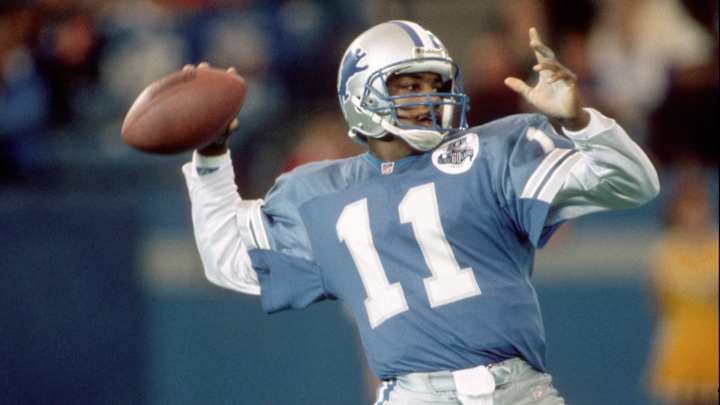The Detroit Lions had a long-standing problem before Matthew Stafford arrived — they just couldn’t seem to get it right at quarterback. Time after time, the team burned through first-round picks and veteran passers, only to watch them fall short of expectations. But out of all the misfires under center, one name stands out as possibly the worst of them all.
This wasn’t just a bad pick — it was a selection that sent shockwaves through the NFL Draft world, leaving a cautionary tale that lingered for years. That name? Andre Ware. Once hailed as a potential franchise savior in the 1990s, Ware turned out to be one of the Lions’ most painful misses at quarterback.
Andre Ware: A Legend in College, a Bust in the NFL
At the University of Houston, Ware was nothing short of electric. He captained one of college football’s most explosive offenses under head coach Jack Pardee. Running the famed Run-N-Shoot scheme, Ware led a Cougars offense that lit up the scoreboard to the tune of 53.5 points per game — including one jaw-dropping 95-point outburst.
Even more impressive was what Ware accomplished in limited time. Despite playing only 11 games and often sitting out fourth quarters, he threw for 4,700 yards and 45 touchdowns, setting 27 NCAA records in 1989. On a per-quarter basis, he averaged an eye-popping 127 passing yards. The offense also featured a running back averaging 9.6 yards per carry and a receiver who snagged 22 touchdowns, with the unit piling up an average of 625 total yards per game.
Houston’s program was under NCAA probation at the time, which made Ware’s Heisman Trophy win that year even more impressive. But NFL teams weren’t fully sold. Critics worried that Ware’s numbers were inflated by the pass-heavy system, and they questioned whether his skill set would translate to a more conservative and slower-paced pro game.
Detroit Rolls the Dice — and Pays the Price
Still, Ware’s draft stock remained high heading into 1990 — the same class that included future Hall of Famers like Cortez Kennedy and Junior Seau. The Lions, holding the No. 7 overall pick, took a leap of faith and selected Ware, igniting controversy almost immediately.
Reports surfaced that then-head coach Wayne Fontes had overruled the Lions’ scouting department to make the pick. In protest, Detroit’s scouting director resigned right after the draft. The Lions passed on other big names, including future stars like Emmitt Smith (though some argue Smith wouldn’t have played much with Barry Sanders already in the backfield), Richmond Webb, and LeRoy Butler.
A Career That Never Got Off the Ground
Once in Detroit, Ware struggled to find the field. He began his rookie year buried on the depth chart behind Rodney Peete and Bob Gagliano, starting just one game that season. His performance? Just 13 completions on 30 attempts — hardly what you’d hope for from a first-round pick.
Heading into year two, the Lions still didn’t hand him the keys. Instead, they brought in veteran Erik Kramer to back up Peete. Whenever Peete faltered or got hurt, it was Kramer who stepped in — not Ware. This dynamic continued over the next few seasons as the Lions, thanks largely to Barry Sanders, managed to limp into the playoffs despite lackluster quarterback play.
In four seasons with Detroit, Ware managed just six starts, going 3-3 with five touchdowns and eight interceptions. He was cut following the 1993 season, having never really gotten the chance to prove himself over an extended stretch.
To this day, some still argue that Ware didn’t get a fair shake in the league. After all, many young quarterbacks struggle early in their careers. “What young quarterback doesn’t have a bad six-start stretch?” is a question that still lingers when reflecting on Ware’s brief NFL stint.
Life After Football and a Lingering Draft Impact
After his NFL career ended, Ware found success elsewhere — in the broadcast booth. He’s now a respected college football analyst and has been part of ESPN’s coverage for over two decades.
Interestingly, Ware’s flop didn’t just impact the Lions. His Houston successor, David Klingler, followed a similar path — huge college stats, high draft pick, and NFL disappointment. Klingler was taken sixth overall by the Bengals in 1992, and the failures of both QBs forced NFL scouts to reevaluate how they judged quarterbacks coming from pass-heavy college offenses.
For years afterward, quarterbacks from systems like the Run-N-Shoot or Air Raid were viewed with skepticism. Even future stars like Patrick Mahomes and Lamar Jackson faced extra scrutiny due to their offensive systems.
As far as the Lions are concerned, Ware remains one of many promising quarterbacks who simply never made it in Detroit — but his case might just be the most painful of them all.
